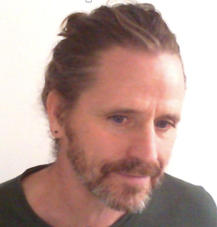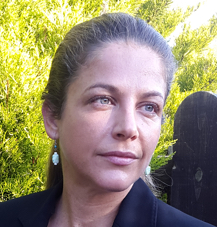The course will be delivered by experts in the field of group facilitation, creative arts, group facilitation, movement practices, leadership, and social justice. These methodologies may be used to facilitate work in prisons, NGO’s, schools and universities, community groups, the NHS, organisations
Mark Hamlin (course director), Raggi Kotak, Mark Rietema, Meg Fenwick, Marina Cantacuzino, Nontokozo Sabic (tbc), Ana Rhodes, Joy Warmington, Tuomas Lehesaari, Diane Rutherford

Mark Hamlin
Mark has worked as a group facilitator for the last 6 years. His focus is on building resilience and community by navigating and exploring difficult dynamics. He currently delivers workshops exploring the UK class system, white identity and racism.
Mark is also part of a team delivering online forums and symposiums exploring the different themes connected to environmental collapse and climate justice.
He practices as a trauma-informed therapist, working for a charity based in Manchester, supporting male survivors of rape and sexual abuse.
He has co-founded and co-run a crisis support service offering free online and phone counselling sessions for people who otherwise find it difficult to access counselling and psychotherapy.
Mark is and advanced student in process-orientated psychotherapy (process work) and registered with the Gender Intelligence Network for therapists and counsellors.
www.wild-wood.org
www.communitycounselling.co.uk

Raggi Kotak
Raggi Kotak is the Director of JEDI Consultancy, offering award winning, transformational approaches to addressing the dynamics of oppression, within a social justice framework. She facilitates dialogue and transformation for individuals and organisations. Her work is built on a solid foundation of legal dexterity, as a human rights barrister working for more than twenty years.
Raggi’s work is cutting edge and unique. She can adapt work to meet the needs of any audience.
jediconsultancy.com/home/

Mark Rietema
Mark is a registered Psychotherapist (UKCP), Somatic Movement Therapist and Group Facilitator. Besides practising psychotherapy, he works as mental health social worker in the NHS, as well as offering workshops and talks related to Embodiment, Creative Practice and Wellbeing. Mark has an MA in Community Arts and has performed in and designed performance projects and community performances.
As a Kings College Associate he collaborated on a number of projects related to dance and well-being for medical students. He also regularly teaches as faculty member for Embody Move UK, facilitates retreats for frontline workers and collaborates with universities internationally.
As a facilitator Mark has experience of large group facilitation through consensus models and through Process Oriented Psychology. He is passionate about what he does and offers a creative, personal, humorous, and emphatic approach to his work. He does this with a blend of embodied knowledge, clinical practice, open mindedness and curiosity.
www.markrietema.com

Joy Warmington
Joy began her leadership career over 30 years ago designing ground-breaking learning programs for marginalised communities. After that she had senior leadership roles in education, local authority and civil society, including 19 years as brap’s CEO, one of the UK’s most progressive equality and human rights charities. brap seeks to rethink our approach to equality in order to make “real” change.
brap’s impressive work portfolio covers research, evaluation, community support and organisational and individual development. Joy’s insights into making equality a reality are sought after by organisations seeking solutions to exclusion and inequality.
In 2019 Joy was awarded an MBE and named one of 50 “Women to Watch” by Cranfield University. As a lifelong learner and recent graduate in process work –a psycho-social method to democratice spaces and address conflict– Joy brings her unerring curiosity and appetite for change and creativity to her work. Areas of specialty: inclusion, anti-racism, organisational change, leadership development, conflict management.
www.brap.org.uk/

Tuomas Lehesaari
Tuomas Lehesaari runs his own private psychotherapy practice in Finland, working with individual, couples, families and groups.
Tuomas has been passionately studying ways to work with the psyche for over 20 years and has been using process oriented inner work in his daily practice for almost 10 years. Tuomas is always curious to map out the inner dimensions of himself, others, and the society. His own interest in different inner work methods arose from a need to process difficult mental health issues when he was 19.
Tuomas has a special interest in altered states of consciousness and is passionate about making them understandable and useful for everyone in everyday life.
Tuomas is also a father, a jiu-jitsu practitioner, and an active participant in a creative community.
https://www.tuomaslehesaari.com/

Meg Fenwick
Meg’s primary training is in theatre and comedy, using creativity as a therapeutic tool to address some of the most edgy, complex issues. With a BA and MA in Contemporary Arts. Meg has used theatre of the oppressed for the last 25 years in some of the most challenging of settings. Meg shares with us resilient practices which both create a safe environment to those who have experienced trauma and an understanding that an element of risk will always be present.
Not satisfied with taking theatre into prisons, education and community settings locally, Meg recently presented her theatre work to the House of Commons. A unique project designed to tackle the national rise in sexual assault at universities.
Meg currently has her own UK based, private practice in relationship and intimacy coaching, working one to one, as well as with couples or group conflict.
Meg has facilitated a large variety of groups all over the world. Her ability to create a permissive, playful space, with much heart, means participants and her clients feel comfortable sharing, enlivened by her creative approach and deeply held by her empathy.

Marina Cantacuzino
Marina Cantacuzino is an author, broadcaster, podcaster and founder of The Forgiveness Project, a charity that she founded in 2004 which works with personal narratives in order to help break cycles of harm and create a more compassionate world. Last year her series Forgiveness: Stories from the Frontline was aired on BBC Radio 4, and her latest of three books on the subject of forgiveness, Forgiveness: An Exploration was published by Simon & Schuster. She has also worked as a tutor for the Arvon Foundation, a charitable organization that promotes creative writing, and recently devised and delivered a residential life-writing course called ‘Turning Pain into Prose’.
In 2020 Marina has been awarded an MBE for services to victims of trauma and abuse in the Queen’s Birthday honours list.
www.theforgivenessproject.com

Ana Rhodes
Ana Rhodes Castro has been living and working in the Findhorn Foundation since 1994. During this time she has worked in a variety of areas within the organisation. She has been a member of the Central Management team over the last nine years, six of those spent being responsible for the area of Spiritual and Personal Development. This consisted of internal trainings, conflict facilitation, supervision and other internal structures that support the Findhorn Foundation to function gracefully and efficiently at an individual and collective level. In February 2009 she stepped into the role of Chair of Management/Focaliser of the Findhorn Foundation.
One of Ana’s greatest passion is maximising the inherent potential of individuals, groups and organisations in a way that is supportive and enhances the natural leadership that lives in people.
Ana is fluent in both Spanish and English and regularly runs trainings and offers consultancy in Spain, the UK and South America.
Ana is an organisational consultant, trainer and supervisor, working with individuals, teams and systems of up to 400 people.
She is the founder of a center dedicated to the Transformation of Human Conflict in Madrid (CTCH www.transformaciondelconflicto.es) in Spain, which runs long term trainings in conflict facilitation, leadership and escalated violence.

Nonty Sabic
Nonty is from South Africa, currently living between Europe and South Africa. She is a teacher of Indigenous Knowledge Systems of South Africa.
Nonty is a workshop leader and a dynamic speaker. Her goal is to send a message of empowerment, service, indigenous wisdom, sustainable living and the importance of building community and ecovillages into modern society.
She has a background in business and events management. She also explored different collaborative mythologies in facilitation, project and group management.
Next to this Nonty is trained as a hospice counsellor and body therapist. Her personal journey includes an initiation in the shamanic ancestral traditions of her tribe, an ongoing study in Buddhism and experience as a novice Buddhist nun.
Nonty is a member of the commons of Europe, currently involved in various organisations that promote sustainable and regenerative ways of living. She is an advocate for climate and social justice, community living, diversity and North-South healing and reconciliation.
In line with this Nonty has been involved since 2013 with the Global Ecovillage Network (GEN). She also served as a co-president for ECOLISE.
Nonty is co-founder and director of RISE (Revivers of Indigenous Spirituality and Ecosystems)
www.riseubuntunetwork.org/about

Diane Rutherford
Diane is brap’s Learning and Development Lead and her qualifications include a PGCE, a Masters in Equal Opportunities and Anti-Discriminatory Practice, a certificate in conflict resolution, and various professional qualifications around equality and cultural competence training. Before joining brap, Diane worked in a Further Educational Institute in Canada, where she was responsibility for supporting minority students and teaching. Prior to leaving for Canada, Diane worked as a further educational lecturer.
Since joining brap, Diane has led on the development of the organisation’s learning portfolio, which includes a range of topics such as: the law, working with diverse teams, coaching leaders, and anti-discriminatory practice, to name a few. Diane’s work engages with the university and health sectors, schools and voluntary organisations. Diane is a faculty member of the NHS Leadership Academy and has delivered the ‘Stepping up’ programme as part of their positive action portfolio of work.
Diane is currently training in process work and therapy with Process Work UK and is a skilled facilitator who incorporates many methods and learning styles to enable full engagement in support of learning and development.













